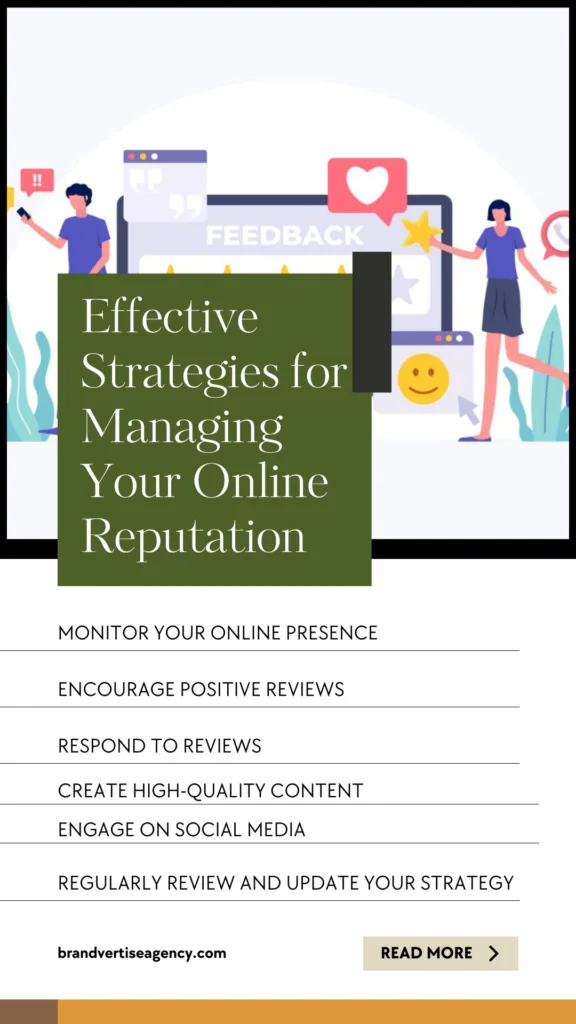In today’s digital age, your online reputation can make or break your business. Whether you’re a small business owner or a major corporation, managing your online reputation is crucial for maintaining a positive image and attracting customers. This blog will delve into effective strategies for managing your online reputation, covering everything from brand reputation strategies to handling online reviews.

Why Online Reputation Management Matters
Your online reputation is the sum of all the interactions, reviews, and content related to your business on the internet. A positive online reputation can lead to increased trust, customer loyalty, and ultimately, higher sales. On the other hand, a negative reputation can deter potential customers and harm your business.
Key Statistics:
- 93% of consumers read online reviews before making a purchase.
- 84% of people trust online reviews as much as personal recommendations.
- Businesses risk losing 22% of business when potential customers find a single negative article on the first page of their search results.
Strategies for Managing Your Online Reputation
1. Monitor Your Online Presence
The first step in managing your online reputation is to know what’s being said about you. Regularly monitor your brand’s mentions across social media platforms, review sites, and search engines.
Tools to Use:
- Google Alerts: Set up alerts for your brand name, products, and key personnel.
- Social Mention: Tracks brand mentions across social media and provides sentiment analysis.
- Review Trackers: Helps manage online reviews from various platforms.
2. Encourage Positive Reviews
Positive reviews can significantly enhance your online reputation. Encourage satisfied customers to leave reviews on platforms like Google, Yelp, and industry-specific review sites.
Tips:
- Ask for reviews at the right time, such as after a successful purchase or positive customer service interaction.
- Make it easy for customers to leave reviews by providing direct links.
- Offer incentives like discounts or loyalty points for leaving reviews.
3. Respond to Reviews
Responding to reviews shows that you value customer feedback and are committed to improving your services. Address both positive and negative reviews promptly and professionally.
How to Respond:
- Positive Reviews: Thank the customer and highlight any specific compliments they mentioned.
- Negative Reviews: Acknowledge the issue, apologize if necessary, and offer a solution or next steps.
4. Create High-Quality Content
Content is a powerful tool for shaping your online reputation. Regularly publish high-quality content that showcases your expertise, values, and customer success stories.
Content Ideas:
- Blog posts about industry trends and tips.
- Case studies and testimonials from satisfied customers.
- Videos and infographics that explain your products or services.
5. Engage on Social Media
Social media platforms are a key battleground for online reputation management. Engage with your audience by responding to comments, participating in discussions, and sharing valuable content.
Best Practices:
- Maintain a consistent posting schedule.
- Use social listening tools to monitor mentions and sentiments.
- Address customer inquiries and complaints promptly.
6. Manage Negative Content
Sometimes, negative content about your brand will appear online. It’s essential to address it effectively to minimize its impact on your reputation.
Steps to Take:
- Assess the Content: Determine if the content is factual, misleading, or defamatory.
- Reach Out: Politely ask the content creator to remove or correct the information.
- Publish Positive Content: Counterbalance negative content with positive stories and reviews.
- Seek Legal Advice: In cases of defamation or false information, consult legal professionals.
7. Invest in SEO
Search engine optimization (SEO) can help control what appears in search results for your brand. By optimizing your website and content, you can ensure that positive information ranks higher than negative content.
SEO Tips:
- Use relevant keywords related to your brand and industry.
- Optimize your website’s meta tags, headers, and content.
- Build backlinks from reputable sites.
8. Leverage Influencers and Partnerships
Collaborating with influencers and industry partners can boost your online reputation. Influencers can reach a wider audience and lend credibility to your brand.
How to Collaborate:
- Identify influencers who align with your brand values.
- Offer partnerships or sponsorships that benefit both parties.
- Encourage influencers to share their honest experiences with your products or services.
9. Regularly Review and Update Your Strategy
Online reputation management is an ongoing process. Regularly review your strategy and adjust it based on new trends, feedback, and changes in your industry.
Review Checklist:
- Analyze the effectiveness of your current tactics.
- Gather feedback from customers and employees.
- Stay updated on industry best practices and emerging trends.
Conclusion
Managing your online reputation requires a proactive approach and consistent effort. By monitoring your online presence, encouraging positive reviews, responding to feedback, and creating high-quality content, you can build and maintain a strong online reputation. Remember, your reputation is one of your most valuable assets, so invest the time and resources needed to protect and enhance it.
By implementing these strategies, you’ll be well on your way to effectively managing your online reputation and ensuring that your brand is viewed positively by current and potential customers.





